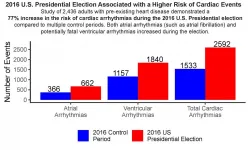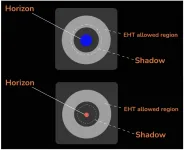Molecule enlists patient's immune system to combat HIV
2021-05-20
(Press-News.org) Antiretroviral therapy, the common approach in the treatment of HIV, halts replication of the virus and has saved the lives of millions of people. However, for patients the drug cocktail becomes a lifetime necessity because they continue to harbor latent HIV in a small number of immune system cells. In the absence of treatment, HIV can again replicate and rebound into full blown AIDs.
A new study, however, suggests that addition of a single small molecule can rip away the cloak that shields those cells containing HIV and make them susceptible the patient's own antibodies that otherwise are not normally of much use against HIV.
For the study, a team of researchers led by scientists at Yale and the University of Montreal Hospital Research Centre stopped antiretroviral treatment for mice carrying human plasma and blood cells infected with HIV. They then treated the mice with a drug developed at the University of Pennsylvania that mimics receptors of immune T cells called CD4. The CD4-like molecule binds to and exposes vulnerable parts of the viral envelope on infected cells.
The mice experienced either no rebound of infection or long delays before active HIV infection restarted, the researchers report May 20 in the journal Cell Host & Microbe.
Researchers hope one day the new treatment may eliminate the need for long-term antiretroviral treatments.
It's sort of like pawn promotion in the game of chess, said Priti Kumar, associate professor of infectious diseases at Yale School of Medicine and lead author of the study
"These antibodies are like pawns," Kumar said. "There are many of them, but they are useless against the source of virus. But with the right move, they can be promoted to a powerful position and score a decisive victory by eliminating infected cells."
The CD-4 like molecule in the presence of antibodies acts like a "can opener" that allows antibodies to recognize the virus and trigger an immune response.
"The virus can now be recognized by patient antibodies that call the immune system's 'police,' the natural killer cells, to get rid of the infected cells," said Andrés Finzi, co-lead author of the study and professor at the Université de Montréal.
"In this way, a patient's own antibodies and cells that are commonly present can eliminate the viral reservoir and prevent viral rebound," Kumar said. "The hope is one day we might be able to do away with antiretroviral therapies altogether."
INFORMATION:
Yale's Richard Flavell and Amos B. Smith of the University of Pennsylvania are also co-corresponding authors of the paper.
ELSE PRESS RELEASES FROM THIS DATE:
2021-05-20
HOUSTON - Researchers at The University of Texas MD Anderson Cancer Center have developed a first-of-its-kind artificial intelligence (AI)-based tool that can accurately identify rare groups of biologically important cells from single-cell datasets, which often contain gene or protein expression data from thousands of cells. The research was published today in Nature Computational Science.
This computational tool, called SCMER (Single-Cell Manifold presERving feature selection), can help researchers sort through the noise of complex datasets to study cells that would likely not be identifiable otherwise.
SCMER may be used broadly for many applications in oncology and beyond, explained senior author Ken Chen, Ph.D., associate professor of Bioinformatics ...
2021-05-20
A national study from researchers at Michigan Medicine found that nearly 3% of insured U.S. adults under 65 take medications that weaken their immune systems.
The findings, published in JAMA Network Open, are based on data from over 3 million patients with private insurance. They focus on patients' use of immunosuppressive drugs, including chemotherapy medications and steroids such as prednisone.
The analysis reveals nearly 90,000 people met the study criteria for drug-induced immunosuppression that may elevate risk for severe COVID-19 symptoms and hospitalization ...
2021-05-20
Young children who practice visual working memory and reasoning tasks improve their math skills more than children who focus on spatial rotation exercises, according to a large study by researchers at Karolinska Institutet in Sweden. The findings support the notion that training spatial cognition can enhance academic performance and that when it comes to math, the type of training matters. The study is published in the journal Nature Human Behaviour.
"In this large, randomized study we found that when it comes to enhancing mathematical learning in young children, the type of cognitive training performed plays a significant role," says corresponding author Torkel Klingberg, professor in the Department of Neuroscience, Karolinska Institutet. "It is an important finding because it provides ...
2021-05-20
A particular type of dendritic cell is responsible for the tissue damage that occurs in non-alcoholic steatohepatits (NASH) in mice and humans. The dendritic cells cause aggressive, proinflammatory behavior in T cells, as now discovered by researchers from the German Cancer Research Center (DKFZ) in collaboration with colleagues from Israeli research institutes. Blocking these dendritic cells alleviates symptoms in mice. This type of approach might also prevent the development of serious liver damage in NASH patients.
Obesity is extremely widespread in the Western world, and 90 percent of those affected show signs of fatty degeneration of the liver. If they maintain an unhealthy lifestyle ...
2021-05-20
Solar geoengineering -- putting aerosols into the atmosphere to reflect sunlight and reduce global warming -- is not a fix-all for climate change but it could be one of several tools to manage climate risks. A growing body of research has explored the ability of solar geoengineering to reduce physical climate changes. But much less is known about how solar geoengineering could affect the ecosystem and, particularly, agriculture.
Now, research from the Harvard John A. Paulson School of Engineering and Applied Sciences (SEAS) finds that solar geoengineering may be surprisingly effective in alleviating some of the worst impacts of ...
2021-05-20
CHAPEL HILL, NC - American politics can be stressful and confrontational, which can lead to anger. The combination of intense stress and negative emotions can trigger potentially fatal cardiovascular events in people who are susceptible to these health issues. But the direct link between a stressful political election and an increase in cardiac events hadn't been established, until now. A new study in the Journal of the American Heart Association is the first to show that exposure to a stressful political election is strongly associated with an increase in potentially life-threatening cardiac events.
"This retrospective ...
2021-05-20
A team led by a social work researcher at The University of Toledo has published the first empirical evidence that emotional support animals can provide quantifiable benefits to individuals with serious mental illness who are experiencing depression, anxiety and loneliness.
The research brings credence to the many anecdotal reports of emotional support animals having positive impacts on chronic mental health issues.
"This is the first peer-reviewed, published scientific evidence that emotional support animals may benefit people's mental health," said Dr. Janet Hoy-Gerlach, a professor of social work and the lead investigator on the project. "My hope is that our pilot study catalyzes additional research in this area with more rigorous ...
2021-05-20
FRANKFURT. As first pointed out by the German astronomer Karl Schwarzschild, black holes bend space-time to an extreme degree due to their extraordinary concentration of mass, and heat up the matter in their vicinity so that it begins to glow. New Zealand physicist Roy Kerr showed rotation can change the black hole's size and the geometry of its surroundings. The "edge" of a black hole is known as the event horizon, the boundary around the concentration of mass beyond which light and matter cannot escape and which makes the black hole "black". Black holes, theory predicts, can be described by a handful ...
2021-05-20
When scientists hunt for life, they often look for biosignatures, chemicals or phenomena that indicate the existence of present or past life. Yet it isn't necessarily the case that the signs of life on Earth are signs of life in other planetary environments. How do we find life in systems that do not resemble ours?
In groundbreaking new work, a team* led by Santa Fe Institute Professor Chris Kempes has developed a new ecological biosignature that could help scientists detect life in vastly different environments. Their work appears as part of a special issue of theBulletin ...
2021-05-20
The chemical bisphenol F (found in plastics) can induce changes in a gene that is vital for neurological development. This discovery was made by researchers at the universities of Uppsala and Karlstad, Sweden. The mechanism could explain why exposure to this chemical during the fetal stage may be connected with a lower IQ at seven years of age - an association previously seen by the same research group. The study is published in the scientific journal Environment International.
"We've previously shown that bisphenol F (BPF for short) may be connected with children's cognitive development. However, with this study, we can now begin to understand which biological mechanisms may explain such a link, which is unique for an epidemiological study." ...
LAST 30 PRESS RELEASES:
[Press-News.org] Molecule enlists patient's immune system to combat HIV





